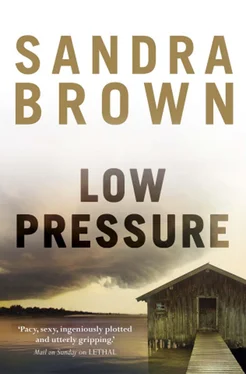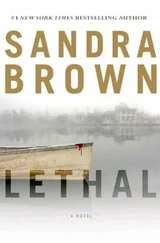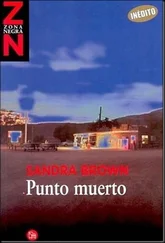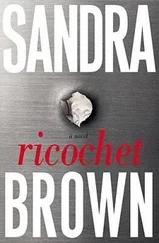“Dent.”
“Did you wake up convinced I’m innocent?”
“Not guilty. But far from innocent.”
“There’s a difference?”
“In my mind. How’s your back?”
“I think the cut closed up overnight. There’s no fresh blood on the bandage.”
He still looked like the survivor of a long battle. The cuts on his face had begun to scab, but they were puffy and surrounded by dark bruises.
Motioning at the telephone directory, which, judging from the looks of it, was several generations old, she asked who he was looking up.
Sidestepping the question, he stretched out his long legs beneath the table. “Go with me for a minute here.”
“All right. I’m listening.”
“Assume that all this—the rat delivery through last night’s parking lot adventure—is reprisal.”
“For the book?”
“For that and/or the incident that inspired it. In your kitchen yesterday, one of us remarked that it would be a short list of people who would harbor that kind of grudge and go to those lengths to settle it.”
“You said that, or near enough. You asked me who I thought the mystery guest was.”
“Okay, let’s name the possibilities.” He raised his finger as though to count them off. “Me.”
“You didn’t fake the knifing.”
“So I’m eliminated? Thanks,” he said drily. A second finger joined the first. “Your parents.”
“We can strike them, too. Cancer is a solid alibi.”
He held up a third finger. “Steven. He has some serious issues and grievances.”
“But it wasn’t he who jumped you last night. Besides, he wouldn’t harm me, no matter how angry he is over the book.”
“I guess,” he said, but dubiously. “Those are the principals. If it’s not one of us, it’s gotta be someone more removed.”
“Tangential.”
“Back to the big words. But, yeah.”
“Dale Moody?”
“Possibly. But what’s his beef? Besides coming across as not too bright or competent in your book.”
“Daddy said he looked like a troubled man during the trial. He should have been pleased with the conviction. What was the problem?”
Of course Dent didn’t have the answer, but thoughtfully he added, “Moody’s a big guy, or was, like the lummox who jumped me. Let’s put a check mark next to his name. Who else?”
“What about Rupe Collier?”
“Definitely wasn’t him at the IHOP.”
“No. So who does that leave?”
“Strickland.”
She reacted with a start.
“Not Allen,” he said. “But maybe his brother. Roy.”
“Ray,” she corrected.
He motioned at the directory. “That’s who I was looking up.”
“What made you think of him?”
“Process of elimination. Of this group of people involved, even tangentially—did I say it right?—he and Allen were by far the most redneck.” He looked down at the cut across his knuckles. “He’d be royally pissed by how his big brother was portrayed in your book.”
“It was a fair portrayal.”
“Of a killer. But what if he wasn’t? An excellent reason for a vendetta is your brother getting sent to prison for a crime that he didn’t commit.”
“And then dying there.”
“Allen didn’t die , Bellamy. He was murdered .”
She flinched at the word, and it reverberated there between them for several ponderous moments. Less than two years into his twenty-year sentence for manslaughter, Allen Strickland had been fatally stabbed in the Huntsville prison yard by a fellow inmate.
After a prolonged silence, Dent pulled in his legs and leaned upon the table. “We’ve talked about every aspect of this business, but you’ve never mentioned Strickland’s ultimate fate. Why’s that?”
“Habit, I suppose,” she said quietly.
“Habit?”
“I remember the day we found out he’d been killed. I was a freshman in high school. Rupe Collier called my parents just as I was about to leave for class.”
“How did they react to the news?”
“They didn’t receive it cheerfully, which would have been distasteful and insensitive. But they weren’t so hypocritical that they expressed deep sorrow, either. Daddy just looked… very somber. I remember him saying, ‘That’s an end to it, then.’
“And the way he said it was like… like a mandate that it never be spoken of. Then he got up and left the room. Olivia followed him. To my knowledge, no one in our household ever mentioned Allen Strickland’s death again.”
Steven hadn’t referred to it yesterday. Nor had her father, who had referenced Strickland’s imprisonment but not how he’d died. Perhaps the question posed by Van Durbin in his column yesterday had made them all too uneasy to talk over the possibility that not only had he been unjustly incarcerated, but that he’d also died needlessly.
“I ran across Ray Strickland’s name when I was researching the book,” she said to Dent. “He was quoted in numerous newspaper write-ups of the trial, always professing his brother’s innocence. But if he was the man at IHOP, I wouldn’t have recognized him. The man I remember from the photographs had bushy hair and a mustache that grew down over his jaw.”
“A razor would have taken care of both in five minutes.”
“Did you find a telephone listing for him?”
“No. But I don’t believe we’ll have to search for him. He’ll find us.”
That was an unnerving thought. “Maybe we should get the police involved, after all. We could report last night’s assault on you, give them his name, and—”
“And if Ray Strickland, brother of the late Allen, turns out to be a law-abiding, tax-paying, churchgoing man living in the suburbs with a wife and adoring children, you’ll have made another enemy. It would make news, and Van Durbin, assuming he survived his night in lockup, would—”
She waved her hands to cut him off. “I see where you’re going.” As she organized her thoughts, she pulled her lower lip through her teeth. “We don’t know that Strickland is our pickup driver, but it feels right.”
“It does to me, too. Low Pressure ends with Allen receiving his sentence. You didn’t cover his death in prison. Ray might’ve seen that as a slight. He might consider it unfair. In his mind, you exploited his personal tragedy, but you didn’t tell the whole story.”
She placed her elbows on the table and held her head. “Lord. I would happily apologize.”
“I don’t think that’s gonna do it for the guy I met last night.” He exhaled heavily. “On the other hand, I could be way off track. The hell of it is, we don’t know who we’re dealing with.”
She dropped her hands back onto the table. “There’s still Moody.”
He thumbed the curled pages of the phone book. “I also tried to look him up.”
“Good luck with that.”
“When you were trying to locate him before, did you contact the Austin PD?”
“I started there. I was told that he’d retired, but that’s all I learned. Human Resources claimed not to have an address for him, no contact information whatsoever.”
“He must draw a pension.”
“It’s automatically deposited into a checking account. The bank is headquartered in North Carolina, and they hung up on me when I asked for privileged information about their customer. I ran a Google search and tried to obtain his social security number, but gave up when I came under suspicion of identity theft.”
“Family?”
“An ex-wife who said she didn’t know where he was, but that she hoped he was in a cemetery.”
“He may be. Did you check death records?”
“Along with tax rolls, voters registration, the DMV.” She shook her head. “Believe me, I looked. And not just in Texas.”
Читать дальше












